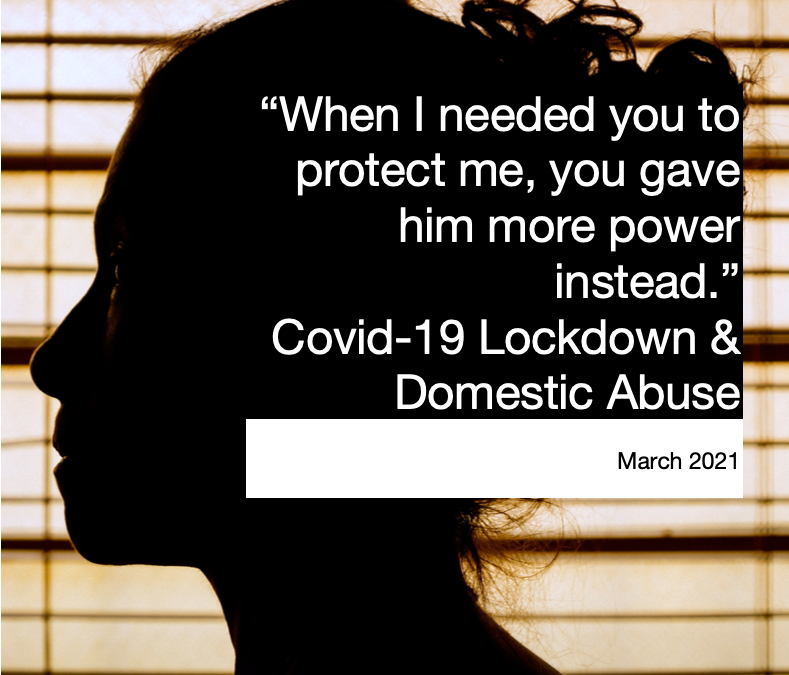We have officially launched our report on the Covid-19 Lockdown and Domestic Abuse. We worked with Solace Women’s Aid to deliver this research, with contributions from University of Greenwich when the first lockdown was instated in March 2020.
Watch an animation of our report here
We had a chat with two of the researchers who were involved in this report: Marianne Moore, Managing Director Justice Studio and Dr Camille Stengel, Senior Lecturer in Criminology at the University of Greenwich.
In this blog they share further, more personal insight on the study, here is what they had to say:
Why did you decide to do this research? – Marianne Moore
As soon as the lockdown was announced in March 2020, my thoughts turned to those who were living in unsafe homes. It seemed to me that the government were coming from this assumption that the outside was dangerous, because of covid, but home was somehow automatically safe. But I knew that this really isn’t the case for so many people, and especially women and children living with perpetrators of abuse. I had this horror about what it might be like for them hearing the news that they were going to be trapped inside an un-safe place, so it was really with that concern in mind, that promoted this research.
Because we are a research and consultancy organisation it made sense to use our skills in this area to do what we could. Our whole reason for being is to give more prominence to those voices that are unheard, and survivors of abuse have been so silenced, it felt important to offer a channel for their experiences. We reached out to Solace because we knew their amazing work and thought they would be a great partner. We, of course, offered our services pro bono and I was delighted when they said they would like to work with us on the project. What was great is that we were then also joined by Camille from Greenwich University and together with our team of in house researchers we were able to co-design the research with the Solace team so that it was best able to ensure the protection of those who participated in it whilst at the same time enabling them to tell their stories.
What were your unique experiences while undertaking this research? – Dr Camille Stengel
As a qualitative researcher, I’ve previously conducted interviews with a range of so-called vulnerable and hard-to-reach populations in a variety of conditions, but never under any sort of lockdown restrictions. Luckily people’s phone and internet connections seemed to be mostly stable, and we were able to interview most participants remotely. The lockdown also meant there was a strangely unifying aspect to the start of all my conversations with participants before the interviews began, as we were all trying to make sense of the unfurling pandemic. There was no shortage of small talk, and it was very easy to build rapport!
Another unique experience was working with Justice Studio. This is the first time I’ve partnered with them on a research project, and it was a pleasure to collaborate with their researchers during the data collection.
Were there any outstanding surprises for you? – Dr Camille Stengel
Yes, many! Two specific surprises were about police response, and service provider risk.
As a criminology lecturer, I am well aware of the barriers victims face when reporting crime, including fear of stigma and victim blaming. Due to sexist attitudes and beliefs, this can be more pronounced with victims of domestic abuse. Given my knowledge, I thought I wouldn’t have been surprised that our research documented some survivors’ negative experiences with the police, including experiences of racism.
However I was surprised that, given the public focus on the increased risk to domestic abuse early on in the first lockdown, that some participants reported insensitive and unacceptable handling of this elevated risk. I was also struck by the service providers’ awareness of their risk. I interviewed one frontline staff member who identified as an ethnic minority, and she was reflecting on the disproportionate deaths of black and ethnic minoritised people during the pandemic. She commented that she realised ‘could be one of them’ – another statistic – while on the tube heading to work.
To me, this highlighted not only the incredible bravery of those on the frontline, but also the multiple vulnerabilities the faced by service providers during the early days of the pandemic.
What would you like to see happen or change as a direct result of this study? – Marianne Moore
What the research proves is that the lockdown was an incredibly difficult time for survivors of abuse, and indeed, as we know, some people sadly didn’t even survive. Whilst it was great to see a lot more coverage of domestic abuse at the beginning of the lockdown than I have ever seen before, the issue is too easily forgotten and the issues swept under the carpet. I would like this research to show what it is like for women in this situation, and also to help people to understand the complexity of the situation, recognising that the response to domestic abuse needs to be strategic, and nuanced not reactive and temporary as it has been so far.
What would you like to see happen or change as a direct result of this study? – Dr Camille Stengel
I think it’s hard to say in terms of direct results, as I recognise this is a small scale study focused on London. However, this research does provide a vignette around the unique phenomenon of how survivors and service providers navigated through the chaos of the first lockdown. This study adds to a growing body of evidence of the ways in which the COVID-19 pandemic, and specifically the lockdown-related restrictions, has impacted survivors and service providers. I hope that this body of evidence means that the gaps in service provision continue to be a priority terms of policy and funding decisions. As outlined in the report recommendations, I’d like to see these priorities manifest as changes in the Domestic Abuse Bill to include support for survivors with No Recourse to Public Funds, and sustainable funding for service providers for staffing and resources.
How can this research impact the scourge of domestic violence? – Marianne Moore
Ideally, I would like this research to contribute to ending domestic violence at a number of different levels. At a national level, the message needs to reach the government that concerted, long term, and intelligent planning and funding must be committed to tackling domestic abuse. They need to listen to the domestic abuse organisations that are working so hard. There needs to be more intelligent and empathetic policing that is not purely punishment focused but really listens to what the survivors want. It would be great if as a community we can be more keenly aware of our social norms around allowing partner abuse – thinking more about our neighbours and friends and making sure we are teaching healthy relationships. Finally, at an individual level, the more people can understand other people’s experiences the more I hope they will reflect on their own: perhaps they might understand that they have experienced, or are experiencing, abuse or perhaps they might understand that they are a perpetrator themselves, and start to understand the impact that has.

Marianne Moore is the Managing Director and Chair at Justice Studio. As a consultant specialised in women’s rights, she has worked for a variety of clients including the UK Government, bodies such as UNICEF and the Council of Europe, and UK and international not for profit organisations.

Dr Camille Stengel is a Senior Lecturer in Criminology at the University of Greenwich.

